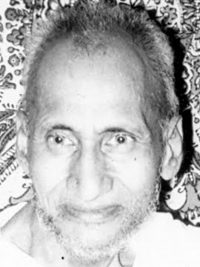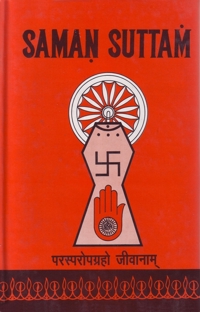29. Dhyana Sutra
PRECEPTS ON MEDITATION
Sisam jaha sarirassa, jaha mulam dumassa ya.
Savvassa sadhudhammassa, taha jhanam vidhiyate. (484)Meditation is enjoined on a monk as the most vital part of his religion, just like the head to a body and the roots to a tree. (484)
Jam thiramajjhavasanam, tam jhanam jam calamtayam cittam.
Tam hojja bhavana va, anupeha va ahava cimta. (485)A steady state of mind constitutes meditation while an active mind might be engaged in either contemplation or deep reflection or thinking. (485)
Lavana vva salilajoe, jhane cittam viliyae jassa.
Tassa suhasuhadahano, appaanalo payasei. (486)Just as salt dissolves due to its contact with water, similarly if the mind becomes absorbed in meditation, the fire of soul shines brightly, burning the auspicious and inauspicious karmas. (486)
Jassa na vijjadi rago, doso moho va jogaparikammo.
Tassa suhasuhadahano, jhanamao jayae aggi. (487)If a person is free from attachment, hatred, delusion and activities of the mind, speech and body, he becomes filled with fire of meditation that burns the auspicious and inauspicious Karmas. (487)
Puvvabhimuho uttaramuho va, houna sui-samayaro.
Jhaya samahijutto, suhasanattho suisarito. (488)A person who being pure in thought and body, concentrates his mind sitting in a comfortable posture, facing the East or the North, becomes absorbed in perfect meditation. (488)
Paliyamkam bamdheum, nisidhamana-vayanakayavavaro.
Nasagganimiyanayano, mamdikayasasanisaso. (489)A person (engaged) in meditation should sit in the palyanka posture, stop all activities of mind, speech and body, fix the gaze of his eyes one the tip of his nose and slow down his expiration and inspiration. (489)
Garahiyaniyaduccario, khamiyasatto niyattiyapamao.
Niccalacitto ta jhahi, java puraovva padihai. (490)Having condemned all one.s evil conduct having begged pardon of all the living beings, having renounced negligence, having steadied one.s mink, one ought to undertake meditation until the thing meditated looks like standing in front of oneself. (490)
Thirakayajoganam puna, munina jhane suniccalamananam.
Gamammi janainne, sunne ranne va na viseso. (491)In the case of monks who have steadied all their mental, vocal and bodily activity and who have thoroughly concentrated their mind on meditation, it does not matter at all whether they stay in a village full of people or in an empty forest. (491)
Je imdiyanam visaya manunna, na tesu bhavam nisire kayai.
Na ya.manunnesu manam pi kujja, samahikame samane tavass. (492)A monk devoted to penance and desirous of practising meditation should neither entertain pleasant nor unpleasant thoughts about the objects of senses. (492)
Suvidiyajagassabhavo, nissamgo nibbhao niraso ya.
veraggabhaviyamano, jhanammi suniccalo hoi. (493)A monk becomes quite steady in his meditation if he has understood thoroughly the nature of mundane existence, is deviod of all attachment, is fearless, is desireless, and has developed an attitude of indifference to the world. (493)
Purisayaro appa, joi varananadamsanasamaggo.
Jo jhayadi so joi, pavaharo havadi niddamdo. (494)A yogin (monk) who meditates upon the soul in human form equipped with supreme knowledge and faith, is a (real) yogi; he puts an end to all his sins and becomes free from conflicting feelings of pain and pleasure. (494)
Dehavivittam pecchai, appanam taha ya savvasamjoge.
Dehovahivosaggam nissamgo savvaha kunai. (495)A monk who sees that soul is distinct from body as well as from all other (external and internal) possessions; becomes free from all attachments and undertakes an absolute renunciation of body as also of all external implements. (495)
Naham homi paresim, na me pare samti nanamahamekko.
Idi jo jhayadi jhane, so appanam havadi jhada. (496)That soul verily undertakes meditation which at the time of meditation knows as follows: 'I do not belong to the others nor do the others belong to me while I am all alone and of the form of knowledge.' (496)
Jhanatthio hu joi, jaino samveya niyayaappanam.
To na lahai tam suddham bhaggavihino jaha rayanam. (497)Verily, if a monk, while doing meditation does not attain the knowledge of his real nature of soul, he cannot secure a precious stone. (497)
Bhavejja avatthatiyam, pimdattha-payattha-ruvarahiyattam.
Chaumattha-kevalittam, siddhattam ceva tassattho. (498)One must undertake meditation over the three states technically called pindastha, padastha and ruparahitatva which respectively stand for an ordinary embodied soul, an embodied soul that has attained omniscience and an emancipated soul. (498)
Avi jhai se mahavire, asanatthe akukkue jhanam.
Uddhamahe tiriyam ca, pehamane samahimapadinne. (499)That Mahavira, having assumed a particular bodily posture and having freed himself from all unsteadiness, undertook meditation. At that time he, free from all worldly desires, would meditatively inspect whatever exist in the upper region, the lower region and the transverse region of the world. (499)
Natitamattham na ya agamissam, attham niyacchamti tahagaya.
Vidhutakappe eyanupassi, nijjhosaitta khavage mahesi. (500)The blessed personages give no consideration to what existed in the past nor to what will exist in the future. Certainly, the great sage, free from all indulgence in imagination and concentrating his thought on what exsted in the present, first dries down and then annihilates (all his karmas). (500)
Ma citthaha ma jampaha, ma cintaha kim vi jena hoi thiro.
Appa appammi rao, inameva param have jhanam. (501)Undertake no bodily act, utter no word and think no thought; thus you will become steady. Certainly, supreme meditation consists in a soul engaged in concentration on itself. (501)
Na kasayasamutthehi ya, vahijjai manasehim dukkhehim.
Isa-visaya-soga-iehim, jhanovagayacitto. (502)A mind engaged in meditation is not perturbed by miseries born of passions nor those born of mental acts nor by jealousy, remorse, sorrow etc. (502)
Calijjai bibhei ya, dhiro na parisahovasaggehim.
Suhumesu na sammucchai, bhavesu na devamayasu. (503)A brave (monk) is neither moved nor frightened by afflictions and calamities; his mind does not become infatuated in the slightest degree, not even by the celestial illusions. (503)
Jaha cirasamciyamimdhanamanalo pavanasahio duyam dahai.
Taha kammemdhanamamiyam, khanena jhananalo dahai. (504)Just as fire favoured by wind speedily burns up the fuel accumulated since long, so also, the fire of meditation destroys in a moment the unlimited fuel of karmas. (504)
 Jinendra Varni
Jinendra Varni

